Many couples would attest that online dating can lead to happy and long-lasting relationships. However, it also comes with many risks, like fraud scams, stalking, and sexual abuse. Sensing these dangers in a digital environment where people hide behind screens is very difficult, so you’d think that when others warn you about them, you’d be grateful, right?
Unfortunately, not in this story. When a woman told her coworker that her online boyfriend asking for $10k might be a scammer, she refused to believe it and even gave her the silent treatment. Only when she wasn’t able to give him the money did she realize that her relationship was all a lie.
Online dating comes with many risks, scams being one of them

Image credits: Meg Aghamyan / Unsplash (not the actual photo)
This woman almost fell for a romance scam but, fortunately, she was warned by her colleague and was able to dodge the bullet
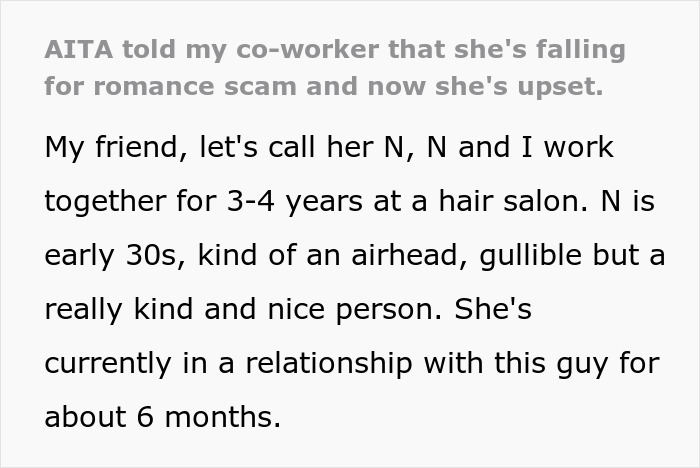
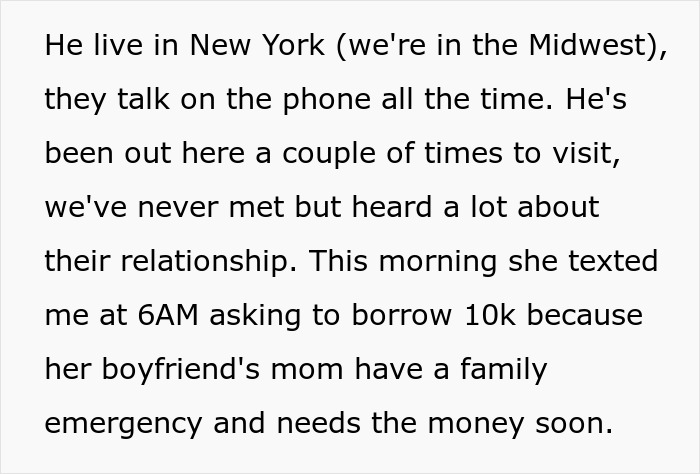

Image credits: Polina Zimmerman / Pexels (not the actual photo)
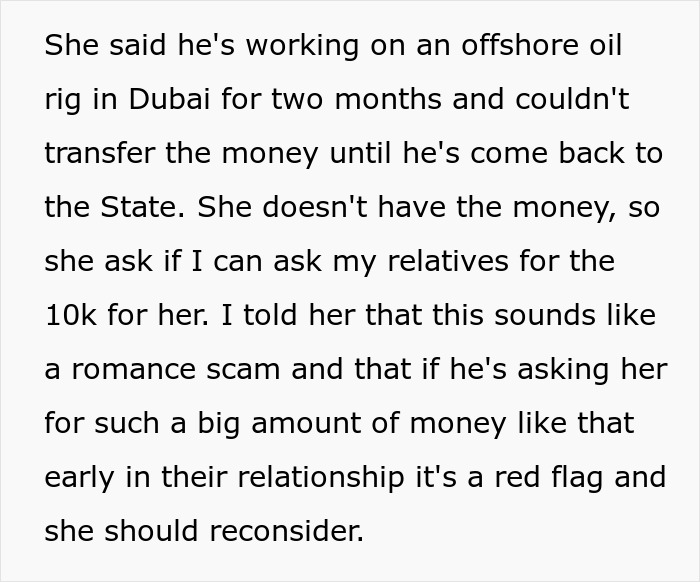
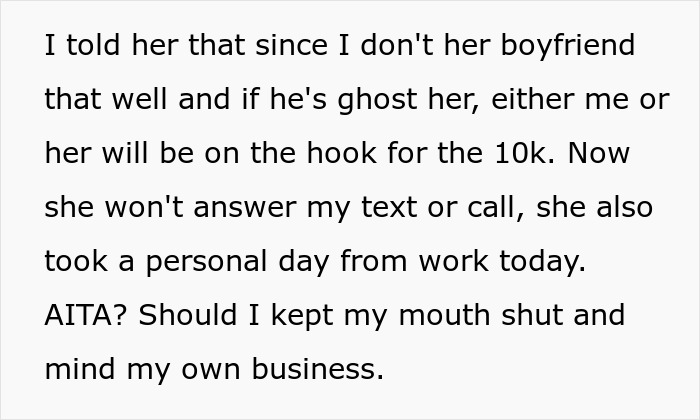
Image credits: topicalneal

Image credits: Kaboompics.com / Pexels (not the actual photo)
People lost over $1.14 billion to romance scams in 2023
The internet is full of various kinds of scams, but the so-called romance scams are one of the most insidious. It’s because the people behind them spend quite a lot of time earning the victim’s trust and affection, and only then do they strike.
“What people need to realize is that people behind these types of scams could teach a master class in human behavior,” said Theresa Payton, CEO of cybersecurity firm Fortalice Solutions. “They know the different emotional trigger points that we all have, and that’s when they strike,” she added.
Romance scammers create fake online identities and trick their victims into thinking they’re someone they aren’t. Then, over time, they develop a relationship, so once the trust is established, the victim may be more easily convinced to send money or provide some crucial personal information. “It’s a really easy way for them to fool their victims because there’s no face-to-face contact,” explained Tracy Kitten, the director of fraud and security at Javelin Strategy & Research.
This way, people lost over $1.14 billion to romance scams in 2023. 40% of them said they were contacted through social media. In addition, research found that men were more likely to fall for romance scams than women. That said, it can happen to anyone, even if they don’t have a big social media presence.

Image credits: Getty Images / Unsplash (not the actual photo)
The brightest red flag of romance scam is requests for money
Fortunately, there are ways to detect if the person showing an interest in you through social media or other online platforms is a romance scammer. The brightest red flag is requests for money. Another warning sign can be unsolicited text messages. Scammers can make use of chatbots to reach out to large numbers of people through their personal numbers or email or social media accounts. A simple ‘hi’ is sometimes all it takes to lure a person in.
If, off the bat, the person seems too good to be true, that also could be a red flag that indicates a romance scam. A person who is interested in the same things as you and wants to continue the conversation on other platforms might be up to something evil. They may use additional tactics such as pressuring you to keep up the relationship but refusing to meet in person or, on the contrary, asking for money to see you.
These are all signs to look out for to avoid romance scams. Unfortunately, they can be hard to notice, as they have established trust with the person who’s manipulating them. Therefore, it might be best to vet every stranger you come into contact with online. This can be done by reverse searching people’s images, as scammers appropriate other individuals’ profile photos.
In addition, being mindful of what information you share on social media, taking your time with the people you meet online, avoiding financial transactions, and meeting in a public spot are all ways you can keep yourself safe while online dating or communicating with strangers on the Internet. Remember, stranger danger is also very applicable online, if not more than in real life.
Commenters thought she was right to warn her coworker of the scam

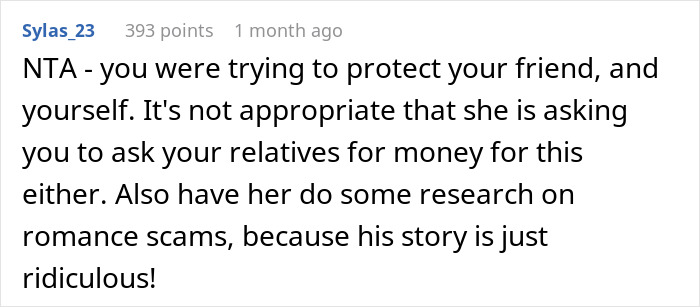
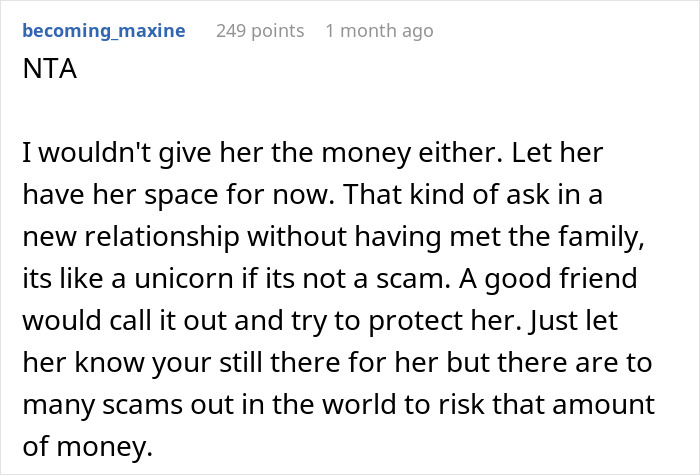



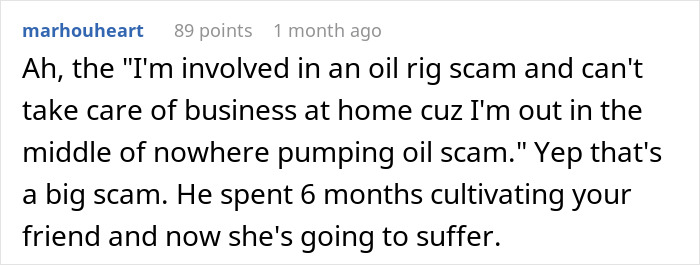
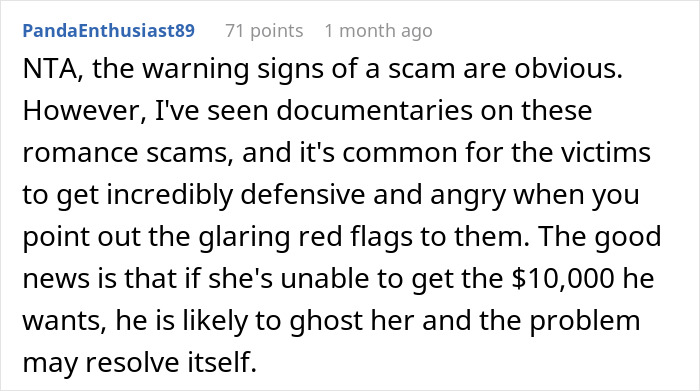











Others even started thinking that the coworker might also be involved and the woman is actually being the one who they tried to scam



Meanwhile, some shared similar stories


Later, the original poster added some more information



And posted an update with a happy ending after two weeks:

Image credits: Solving Healthcare / Unsplash (not the actual photo)



Image credits: topicalneal
from Bored Panda https://ift.tt/QkPFsOx
via IFTTT source site : boredpanda